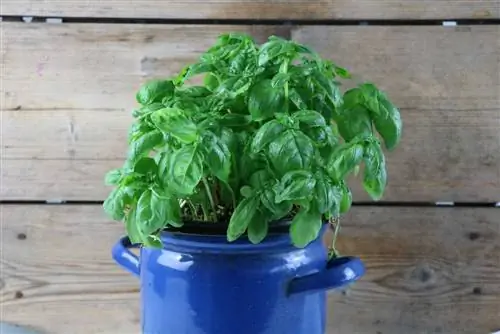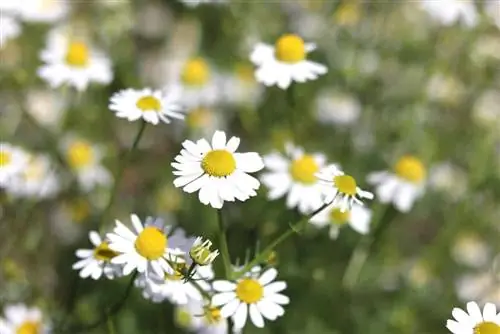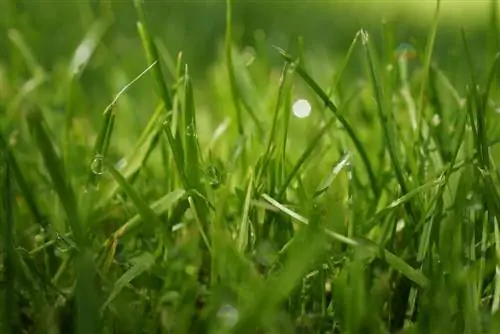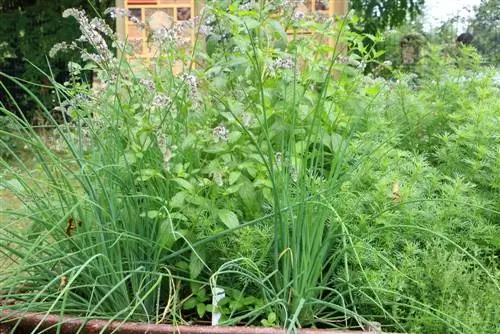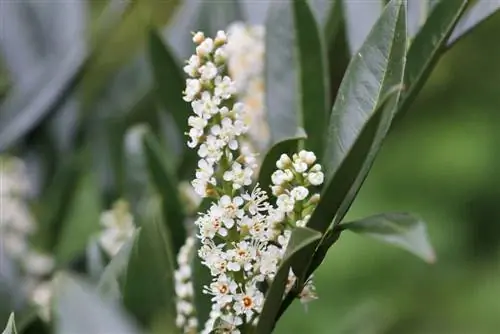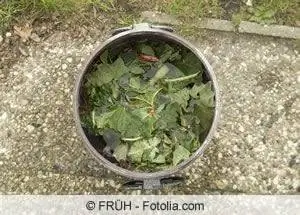- Author admin caroline@plants-knowledge.com.
- Public 2023-12-17 03:39.
- Last modified 2025-01-24 12:45.
In October the temperatures drop daily until they finally reach freezing point. Not all plants survive the cold season without protection. Until the first frosts arrive, culinary herbs in the garden and on the balcony should be prepared for the winter. What protection the plants need or whether they need special winter quarters varies from species to species.
Annual or perennial herbs
The overwintering of garden herbs depends on the species and its natural habitat as well as life expectancy. Annual plants such as marjoram or dill are not overwintered but grown from seeds in the new year. Biennial and perennial herbs vary in their ability to adapt to frosty temperatures. Mediterranean plants come from regions with mild winter months and temperatures above freezing. In Central Europe, such plants can easily survive the cold season on the balcony or in the garden if you think about the appropriate winter protection.
Harvesting perennials
Oregano, lemon balm and mint are among the perennials whose above-ground plant parts wither in autumn. The plants emerge from the rootstock in spring. You can harvest and dry the he althy leaves before winter to provide yourself with spices:
- Cut the stem just above the ground
- Removing inflorescences
- dry in the oven at 50 degrees Celsius
- take them out when the leaves crackle when they break
Do not cut back woody plants
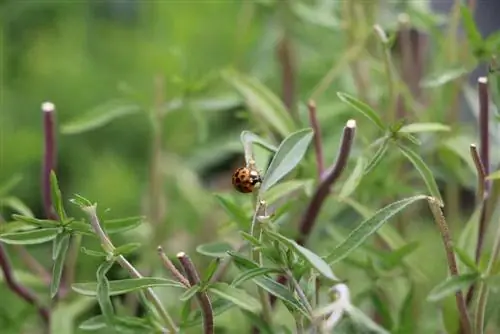
Hyssop, savory and lavender become woody over the years. They develop solid trunks that sprout again every spring. Such garden herbs should not be cut back before winter. Fresh cuts increase the risk of frost damage because they dry out very quickly on sunny days. The woody shoots serve as natural protection for the plants from the cold. Such culinary herbs are pruned after winter. To ensure that the fresh shoots get enough light, the herbs are trimmed by a third.
Preparing herb pots
Large plant pots are wrapped with bubble wrap or thick foam mats so that the substrate is optimally protected from the cold. Place the pots on a protected wall or in the greenhouse, as icy winds can harm the herbs. A different method is recommended for small plant pots:
- Put herb pots in a wooden box
- Stuff leaves into the gaps
- Wrap the box with mats made of reed or coconut fiber
- Tie the insulation with natural fiber cord
- Cover pot ball with leaves
- Choose an area protected from wind and rain
Note:
The protective mats make the wooden box disappear elegantly. Choose large mats to protect plants from cold winds.
Choose underlay
It's not just the cold that poses a danger to plants. Humidity can also cause problems. Garden herbs like a slightly moist substrate so that their shoots do not dry out. Snow and rain cause excessive waterlogging. Both boxes with small herb pots and large containers should be placed on an insulating surface in winter. Styrofoam plates or wooden blocks are ideal. The water does not remain in the pot, where it can freeze due to ground frost, but drains out through drainage holes. Moisture rising from below, which can damage the roots, is also prevented.
Covering bed herbs
Shrubby culinary herbs such as sage, lavender and thyme are grateful for protection from fir branches, brushwood, straw and leaves. These materials do not protect against frost, as it can still penetrate the ground. Rather, the protective layer prevents the leaves from losing excessive moisture on sunny days. They cannot absorb these again in the frozen ground, which results in damage to the plant. To prevent the substrate from becoming waterlogged, you should place the plants in an elevated place in the bed.
Relocate sensitive outdoor plants
Ginger thyme, rosemary and lavender can overwinter in the bed or be transplanted into large clay pots in late summer. Shortly before Christmas they go into a greenhouse where they are planted out. They survive the winter in slightly moist soil. Indoors it is usually too warm for these herbs and the light requirements cannot be met. If you don't have a greenhouse, you can overwinter the potted plants on the balcony as follows:
- Wrap the pot with wood or sheep wool
- Cover shoots with a breathable winter fleece
- Bamboo sticks or wicker serve as scaffolding
- Keep the soil slightly moist and mulch about five centimeters thick
Tip:
When buying winter fleece, pay attention to gardener quality. These materials are no lighter than 90 grams per square meter and provide optimal protection.
Reposition non-frost hardy plants
Basil, lemon verbena and scented pelargoniums do not survive the winter in pots under outdoor conditions. In their winter quarters they need temperatures between ten and 15 degrees Celsius and increased humidity. If you overwinter the garden herbs in the kitchen, you should put a bowl of water next to the pot. Make sure that the plant ball does not dry out.

